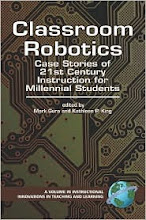
"A Robot in Every Korean Kindergarten by 2013?"
If you want humans to fear and respect their robot overlords you have to start early. Elementary school children in Korea in the cities of Masan and Daegu are among the first to be exposed to robotic teachers. Among them is a robotic English instructor named EngKey developed by the Korea Institute of Science and Technology (KIST). EngKey can hold scripted conversations with students to help them improve their language skills, or a modified version can act as a telepresence tool to allow distant teachers to interact with children. The arrival of EngKey to Masan and Daegu is just a small step in the mechanization of Korean classrooms: the Education Ministry wants all 8400 kindergartens in the nation to have robotic instructors by the end of 2013. Watch out kids, you don’t want to misbehave when your teacher can crush you in its metallic grip.
EngKey can be a harsh mistress. This child mispronounced his sentence and was told to repeat it. Don't worry kid, just go off script and you'll cause the bot to fry a wire.
As we reported earlier in the year, Korea has been looking to expand the role of robotic assistants in classrooms. Most models, including EngKey, act primarily in support roles for real human teachers. Rightfully so. EngKey can’t handle improvisation, and students must follow a script carefully when practicing their pronunciation with the robot. The value of the bot comes in the student’s fascination and comfort with a toy-like device. Students aren’t intimidated as they may be with an adult, can more freely make mistakes, and hopefully, learn from them. Preschoolers seem to respond well to another robot used in classrooms, Genibo the dog. Teachers can use Genibo to show children dance and gymnastic moves, and their interest in the device helps maintain their attention through the lesson.
Of course, the novelty of robots can wear off with continued exposure, and I’m not sure about the longterm use of robots as attention-getting assistants. In second grade I really loved learning using audio books on a cassette, but I quickly figured out it was the same lectures as I normally got in the classroom, just captured on tape. Korea’s probably right to focus the first wave of their robotics programs at the youngest children. CNN reports that the Education Ministry is hoping to have 830 bots in preschools by year’s end. At that age, a robot may stay interesting for a longer time. Eventually, however, robots that can’t act like humans are going to have a hard time of instructing human children..."
Read the full article at its source:
http://singularityhub.com/2010/11/02/a-robot-in-every-korean-kindergarten-by-2013/
If you want humans to fear and respect their robot overlords you have to start early. Elementary school children in Korea in the cities of Masan and Daegu are among the first to be exposed to robotic teachers. Among them is a robotic English instructor named EngKey developed by the Korea Institute of Science and Technology (KIST). EngKey can hold scripted conversations with students to help them improve their language skills, or a modified version can act as a telepresence tool to allow distant teachers to interact with children. The arrival of EngKey to Masan and Daegu is just a small step in the mechanization of Korean classrooms: the Education Ministry wants all 8400 kindergartens in the nation to have robotic instructors by the end of 2013. Watch out kids, you don’t want to misbehave when your teacher can crush you in its metallic grip.
EngKey can be a harsh mistress. This child mispronounced his sentence and was told to repeat it. Don't worry kid, just go off script and you'll cause the bot to fry a wire.
As we reported earlier in the year, Korea has been looking to expand the role of robotic assistants in classrooms. Most models, including EngKey, act primarily in support roles for real human teachers. Rightfully so. EngKey can’t handle improvisation, and students must follow a script carefully when practicing their pronunciation with the robot. The value of the bot comes in the student’s fascination and comfort with a toy-like device. Students aren’t intimidated as they may be with an adult, can more freely make mistakes, and hopefully, learn from them. Preschoolers seem to respond well to another robot used in classrooms, Genibo the dog. Teachers can use Genibo to show children dance and gymnastic moves, and their interest in the device helps maintain their attention through the lesson.
Of course, the novelty of robots can wear off with continued exposure, and I’m not sure about the longterm use of robots as attention-getting assistants. In second grade I really loved learning using audio books on a cassette, but I quickly figured out it was the same lectures as I normally got in the classroom, just captured on tape. Korea’s probably right to focus the first wave of their robotics programs at the youngest children. CNN reports that the Education Ministry is hoping to have 830 bots in preschools by year’s end. At that age, a robot may stay interesting for a longer time. Eventually, however, robots that can’t act like humans are going to have a hard time of instructing human children..."
Read the full article at its source:
http://singularityhub.com/2010/11/02/a-robot-in-every-korean-kindergarten-by-2013/



No comments:
Post a Comment